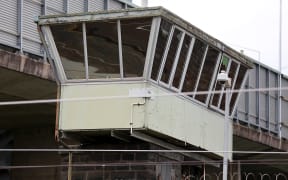Prison staff failed to search an inmate's cell and neglected to clean an in-cell camera which had been obscured for 15 days before he died.

The inmate died at Mt Eden Prison in 2014. Photo: RNZ / Diego Opatowski
Wayne Hotton died by suicide at the then-Serco run Mt Eden Correctional Facility on 6 September 2014.
In a finding released today, Coroner Debra Bell stated that the lack of cell searches, staff shortages and the obscured camera provided the father-of three the opportunity to prepare for his suicide.
At the time, Serco ran the prison under a public-private partnership. However, 10 months after Mr Hotton's death, Corrections stepped into and took back control after it was revealed fight clubs had been taking place at least once a week.
As a result, recommendations made to the prison after an investigation into Mr Hotton's death were not necessary.
The finding noted that the 45-year-old, who was facing drugs charges, had left a note in his cell which stated his decision to take his own life had nothing to do with the prison, its staff or any inmate. The note also stated he had been treated fairly by staff.
In a letter to his former partner, Mr Hotton has expressed his intention to take his own life.
Corrections was unable to provide Coroner Bell with his original prison and medical file, and as a result she could not be satisfied he was assessed properly.
If under assessment, at-risk prisoners need to be observed at 30-minute intervals.
The "prison records are murky" as to when Mr Hotton was on observation, but at the inquest prison staff said that there were no concerns for his safety.
An investigation after Mr Hotton's death found that a substance, described as being toothpaste by police, had been smeared on the camera lens of the in-cell CCTV camera.
Coroner Bell said the lack of response by prison staff to clean the camera was a "missed opportunity", and ultimate responsibility for cleaning it lay with Serco.
At the time, there were also severe staff shortages and Mr Hotton's cell had not been searched for 25 days. Although Serco's contract stated that cells only needed to be searched every quarter, Coroner Bell noted that AFC searches should be carried out daily.
If that had happened, prison staff would no doubt have discovered some items in the cell, including poems and a note.
Coroner Bell noted though that there is no direct evidence that staff shortages affected him personally.
In her findings, Coroner Bell did not make any recommendations as Corrections had already increased staffing levels and more frequent cell searches.




